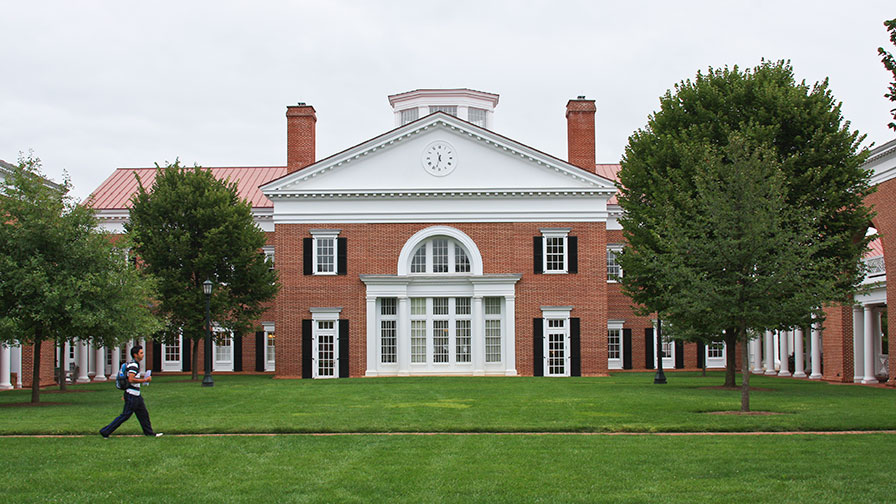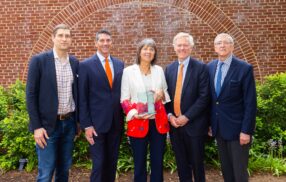
UVA Darden School’s Shanghai Investing Summit Delivers Insights From China
By Julie Daum
Though GDP growth in China has waned in recent years to a still remarkable 7.5 percent, China’s $4.5 trillion stock market is booming as one of the world’s best-performing. A top global exporter, China is attracting record amounts of foreign investment — and is also investing billions of dollars abroad. In other parts of the world, the Japanese and European economies are struggling, while the U.S. stock market has reached historical highs. In this uncertain, volatile environment, one thing is clear: The world of investing is increasingly defined by its global nature.
Against this backdrop, the University of Virginia Darden School of Business and the Antai College of Economics at Shanghai Jiao Tong University hosted the 2015 Shanghai Investing Summit on 8 May 2015 in Shanghai’s sky-high financial district, Pudong. Antai’s Dean Lin Zhou and Darden’s Dean Robert F. Bruner welcomed more than 175 professional investors, professors and students — including students from Darden’s Global MBA for Executives — to the summit, which examined the topic “Cross-Border Investing.”
Newsmakers headlined the program, including Ruyin Hu, chief economist of the Shanghai Stock Exchange; Robert J. Hugin (MBA ’85), chairman and chief executive officer of Celgene Corporation; and Ming Zhang, director and senior research fellow in the Department of International Investment of the Institute of World Economics and Politics at the Chinese Academy of Social Science.
CHINA’S STOCK MARKET SURGE
A well-known Chinese economist, Ruyin Hu evaluated the “bullish” Shanghai Stock Exchange, one of only two markets in mainland China (the other is the Shenzhen Stock Exchange). A recent new trading link between the Shanghai and Hong Kong exchanges has enabled foreigners to access China’s market, though with some restrictions due to tight capital account controls exercised by authorities.
“It’s really the beginning of the Chinese securities market,” said Ruyin Hu, noting the current wave of change marks the market’s entry into a third stage of development. “For China’s capital market to transform successfully into a mature market, three elements — liberalization, legal order and professional capacity — have to develop together.”
Hu predicts a burst of innovation in China, rapid development of the M&A market, the professionalization of the Chinese investor and a deepening capital market. “In the future, when we turn on the television, we want to see the performance of the Shanghai Stock Exchange — not the future of Wall Street.”
OPPORTUNITIES IN HEALTH CARE
 Celgene CEO Bob Hugin offered his perspectives on investing in the Chinese economy, honed over five years of building the global biopharmaceutical company’s business in China. He outlined the tremendous opportunities and cautioned of the complexities.
Celgene CEO Bob Hugin offered his perspectives on investing in the Chinese economy, honed over five years of building the global biopharmaceutical company’s business in China. He outlined the tremendous opportunities and cautioned of the complexities.
In this country of 1.3 trillion people, 4.1 million investment accounts are opened per week. The growing middle class — which could include 500 to 700 million people by the next decade — is a future economic engine, he said. China produces 49,000 Ph.D.s a year and has opened 22 biomedical research parks in the last few years.
Hugin also described challenges on the other side of the ledger, including a rapidly aging population, serious environmental issues, the consequences of an unprecedented human migration to urban areas, and the nature of government control and policies. China grapples with serious health care challenges, including lack of care in rural areas, overwhelmed emergency rooms in the cities, patent issues and underfunded regulatory processes.
“When outsiders think about investing in China, we need to realize that the metrics we use need to be Chinese metrics,” he said. He urged the audience to work to understand the environment and to realize that the Chinese economic agenda is powerful and visionary; investments that align with this agenda will prosper.
CHINA’S FOREIGN INVESTMENTS
Ming Zhang, who researches international finance and the Chinese macro-economy, addressed China’s outward direct investments (ODI). In 2013, China became the world’s third largest ODI country, topping $100 billion for the first time. Mining and manufacturing are leading the growth, and China’s investors look to acquire natural resources and advanced technology.
Zhang identified some of the root causes for failed ODI attempts — political resistance, obstruction from rivals and unfavorable market conditions, to name a few — and listed Hong Kong, the Cayman Islands and the United States as key destinations for Chinese investors.
WHERE AND HOW TO INVEST
Two additional panels moderated by Darden Professor Kenneth M. Eades and Antai Professor Xin Chen opined on the state of investing, potential pockets of opportunity, and the long and short of public markets.
“You can never outsmart the locals,” said J. Peter Chen, head of Greater China, Canadian Pension Plan Investment Board, which manages Asian investments for Canada’s pension fund. “So it’s best to get a local partner.”
Richard Mayo, chair and founder of Mayo Capital Partners, highlighted opportunities for Chinese investment in the U.S. “To get a cash return, the best places in today’s world are U.S. corporations that are now willing more than ever to return a significant amount of the cash flow to the stakeholders,” he said.
Bradford Willmore, executive managing director and portfolio manager of Sarus Capital Management, who works in San Francisco and Saigon, urged investors to think by asset class when investing across borders. How does a particular asset class — whether foreign direct investment, a manufacturing facility, private or public equity — fit within a region’s regulatory and investing environment?
Xuefeng Qian, founding partner and chair of New Access Capital, a Shanghai-based corporate finance adviser, predicted that Chinese technology companies — primarily traded on Wall Street — will relist on China’s stock exchanges, which are currently dominated by retail investors rather than institutional investors.
“Just a few years after Chinese technology companies flocked to sell shares in New York, the trend is reversing as a growing number of them are seeking to take their listings home in the new few years,” he said.
The summit was presented by the Darden School’s Center for Global Initiatives and Richard A. Mayo Center for Asset Management and sponsored by Virginia Economic Development Partnership. Media partners included Shanghai United Media Group andSina.com.cn. Photos from the summit are available through Darden’s Flickr.
The third annual Shanghai Investing Summit will take place in May 2016.
The University of Virginia Darden School of Business prepares responsible global leaders through unparalleled transformational learning experiences. Darden’s graduate degree programs (MBA, MSBA and Ph.D.) and Executive Education & Lifelong Learning programs offered by the Darden School Foundation set the stage for a lifetime of career advancement and impact. Darden’s top-ranked faculty, renowned for teaching excellence, inspires and shapes modern business leadership worldwide through research, thought leadership and business publishing. Darden has Grounds in Charlottesville, Virginia, and the Washington, D.C., area and a global community that includes 18,000 alumni in 90 countries. Darden was established in 1955 at the University of Virginia, a top public university founded by Thomas Jefferson in 1819 in Charlottesville, Virginia.
Press Contact
Molly Mitchell
Associate Director of Content Marketing and Social Media
Darden School of Business
University of Virginia
MitchellM@darden.virginia.edu





